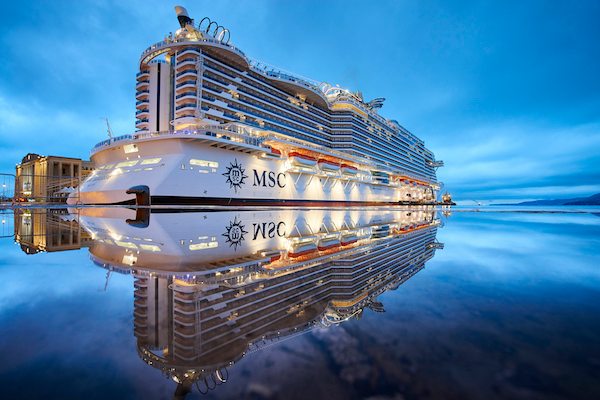Major shipping companies strive to find a balance between respect for the environment and what is economically viable.
A series of proudly announced new ocean liners promise to protect the sea, the air and the climate. Is it possible to make the dream of enjoying a cruise vacation without worrying about the environment come true?
Major shipping companies strive to find a balance between respect for the environment and what is economically viable. A series of proudly announced new ocean liners promise to protect the sea, the air and the climate. Is it possible to make the dream of enjoying a cruise vacation without worrying about the environment come true?
The new generations of ships at least reduce their harmful emissions, for example, through an energy efficient combination of fossil fuels with a battery system or fuel cells. Many details in the design of the ship and the operation on board improve the climatic balance. Sönke Diesener of the German Union for Nature and Biodiversity Conservation (NABU) speaks of "promising solutions".
Some shipping companies have optimized their fleets. "But cruise vacations are still not environmentally friendly," says NABU's head of environmental and transport policy. Highly polluting heavy fuel oil continues to dominate the world's oceans.
Heavy fuel oil powered engines damage the environment with emissions of sulfur oxide, nitrogen oxide, particulate matter and soot, and contribute to the climate crisis with carbon dioxide (CO2) emissions. Lower emitting fuels, such as marine gas oils, are more expensive and emit slightly less CO2.
Even the least polluting LNG or liquefied natural gas, which is seen as a transition solution for cruise ships aiming to reduce environmental impact, only achieves a CO2 reduction of around 20 percent. And it also has drawbacks, as Katharina Koppe of the German Environment Agency explains: "During production, transport and operation, climate-damaging methane escapes into the atmosphere, reducing the CO2 advantage and makes the climate balance, in some cases, even worse than that of ships with marine diesel".
Some shipping companies comply with the regulations of the International Maritime Organization (IMO), the United Nations body responsible for maritime transport, equipping their ships with gas washing systems or "scrubbers", which, however, increase energy consumption. In addition, contaminated wash waters are often disposed of in the sea.
German cruise operator Tui Cruises says that thanks to scrubbers, nitrogen oxide catalytic converters and soot particulate filters, six ships in its fleet emit up to 99 percent less sulfur, 75 less less nitrogen oxide and 60 percent less harmful particles. The company also ensures that the waste is properly disposed of on land.
TUI's goals are ambitious. By 2030, the first ships in its fleet will be completely climate-neutral, Tui Cruises CEO Wybcke Meier recently told the German newspaper "Tagesspiegel". According to Meier, however, there is a big unknown: the sufficient availability of biofuels.
The German cruise line Aida Cruises bets mainly on fossil LNG, which could one day be replaced by synthetic or biogenic fuel. Other German companies, such as Hapag Lloyd or Plantours, sail with marine gas oil.
Grid power from renewable sources is now seen as a ray of hope. The possibility of connecting the ships to the port's electrical network will help reduce emissions and reduce noise and vibrations.
"Environmentally produced grid energy will be very important in the green energy mix of cruise travel," says German professor Harald Zeiss, who specializes in sustainability and tourism.
However, while nearly half of all ships will soon be able to have shore power or can quickly adapt to it, according to the Cruise Lines International Association (CLIA), so far there are only 14 ports worldwide with corresponding connections. Among them are Germans from Hamburg, Kiel and Rostock-Warnemünde, as well as Bergen and Trondheim in Norway and Southampton in England.
Rerouting and efficient driving aided by sophisticated software, as well as exterior coatings to reduce aerodynamic drag, can help reduce fuel consumption. In addition, there are new innocuous techniques to avoid the encrustation of marine vegetation and fauna in the cooling system. In the management of hotels, which consume up to 50 percent of the ship's energy, changes are also being introduced.
"Some ocean giants have better waste disposal and sewage treatment systems than a small municipality," says NABU consultant Diesener. Details such as biodegradable cleaning and care products, optimization of air conditioning systems or recovery of braking energy from elevators and green and fair shore excursions are other steps towards greater environmental protection and sustainability. .
Norway is currently considered a pioneer country on the path to climate-friendly shipping. The ships on the Hurtigruten commuter express line run on marine diesel, which is blended with up to 20 percent biodiesel from food waste.
By 2030, the shipping company wants to be able to offer emission-free cruises. New competitor on the so-called "fast lane", Havila Kystruten, is betting on computer-controlled energy management of its combined LNG and battery system. The boats can run in purely electric mode for up to four hours.
In international waters, ships are authorized to navigate with heavy fuel oil. In coastal areas and in special areas designated by the IMO as Emission Control Areas (ECZs), stricter regulations apply regarding the emission of sulfur and nitrogen oxides. These include the Baltic Sea and the North Sea, the coasts of the United States and Canada, including the waters surrounding Hawaii and the American Caribbean, some areas of China and, in general, all ports of the European Union.
In the Antarctic and, in the future, in the Arctic, ships cannot carry heavy fuel oil on board as a precautionary measure.
German cruise journalist Franz Neumeier suggests "short cruises in the vicinity and arriving by train" as an environmentally friendly option for tourists. In fact, long flights considerably worsen the CO2 footprint of the holidays.
Cruise passengers can voluntarily offset the CO2 with an additional sum of money and thus balance at least the greenhouse gases emitted per head during the trip.















